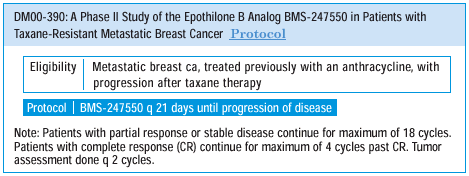| You are here: Home: BCU 3|2001: Section 7

Section 7
Long-term Survival with Metastatic
Breast Cancer
PROLONGED
COMPLETE REMISSION
I believe that
you can palliate patients with metastatic breast cancer very effectively
with the current available treatments, and I have no question that
you can prolong survival. I also believe that you can cure some
patients with metastatic breast cancer. It’s a very small percentage,
but you can do it. My group has published about patients who have
achieved a complete remission with chemotherapy and are in a progression-free
complete remission 20 years later — biopsy proven.
Many of us have
relevant anecdotal situations. For instance, I have a patient who
had a lung metastasis resected in 1968, and she never received any
additional therapy. She never had a second metastasis — metastatic
breast cancer by definition, pathology proven, and she’s alive
and well — 32 years of disease-free survival. Is that sufficient
to call her cured? I don ’t know. But it’s certainly a
major therapeutic advantage.
When speaking
with patients, I do not use the word “cure ” in the metastatic
setting. I say that for the great majority, our realistic expectation
from existing treatments today is to stop the progression of disease
and perhaps reduce tumor burden for some period of time. We can
also control symptoms in the majority of patients — at least
for some time — and there is a very small minority in whom
we can achieve a complete remission. I also say that some patients
remain without a recurrence for very long time periods — and
I tell patients the numbers. In our experience, in untreated patients,
it’s about three percent.
—Gabriel
Hortobagyi, MD
NEW
CYTOTOXIC AGENT IN CLINICAL TRIALS
The epothilones
are very exciting. We are now evaluating the prototype in a phase
II study, but the preclinical and phase I data look very encouraging.
It’s a tubulin active agent that also stabilizes microtubular
formation. It is clearly effective in Taxol-resistant tumor cells.
There’s actually a family of them, but this one is semi-synthetic
and is much more stable than the native compound.
Certainly, chemotherapy
as we know it today has provided some advantages and some benefits,
but I think we will continue to find novel agents that will build
— perhaps step-wise — on what we have. There’s a
whole new group of cytotoxic agents available — designed on
the basis of structure-function interactions. We have already started
to replace some of the older agents with newer ones. I don’t
remember the last time I used mitomycin C for instance; I have not
used Velban® (vinblastine) now for several years, and I have
seldom used methotrexate over the last four or five years. With
capecitabine being available, it’s very likely that 5-FU will
sort of disappear or fade away.
—Gabriel
Hortobagyi, MD

SELECT
PUBLICATIONS
|
Chou TC
et al. Desoxyepothilone B is curative against human tumor
xenografts that are refractory to paclitaxel. Proc
Natl Acad Sci U S A 1998;95(26):15798-802. Full
Text
Greenberg PA et al. Long-term follow-up of patients with
complete remission following combination chemotherapy for
metastatic breast cancer. J Clin Oncol 1996;14(8):2197-205.
Abstract
Lee FY
et al. BMS-247550: A novel epothilone analog with a mode
of action similar to paclitaxel but possessing superior antitumor
efficacy. Clin Cancer Res 2001;7(5):1429-37. Abstract
|
|
